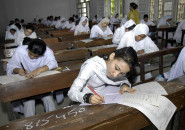Fallout: You reap what you sow
Three separate sessions drew starkly similar conclusions.

Three separate sessions drew starkly similar conclusions. PHOTO: FILE
Learning the hard way, but still not being able to learn the lesson; Pakistan while struggling in today’s time can only look back in history to appreciate a few and blame a few for the state it’s in today.
Zahid Hussain and Rasul Bakhsh Rais accompanied Moonis Ahmar, the author of “Conflict Management and vision for a Secular Pakistan” for an insightful session on politics, democracy, extremism and secularism.

Taking a trip down a “de-tracked” memory lane, it is only evident that political leaders in the past have played an eminent role in wheeling Pakistan to where it stands today. While discussing the role of different political eras, Rais said the vision of Pakistan was of a moderate Muslim state that includes religious minorities, and not an Islamic state per se. “Throughout the 60s and 70s, leaders used Islam to legitimise themselves” said Rias.
But the de-tracking process really gained steam when it became state policy that no party will be allowed to contest the elections until it believes in Islamic ideology or that the head of state cannot be a non-Muslim. “These forces are so strong that no political leader today can reverse those wrongs” said Rais.
Meanwhile, a discussion on the unmitigated disaster that was Kargil mostly saw ‘established’ details discussed by journalist Nasim Zehra, then-ambassador to the US Riaz Khokhar, former diplomat Tariq Usman Hyder and Daily Times editor Rashid Rehman, with the most notable remark being Rehman’s rhetorical question, “Did the military ignore the nuclear factor? What if [the conflict] went beyond the limited theatre?” with reference to an earlier comment from another panellist on how, post-nuclear test, the clash served as the first brushstroke in painting Pakistan’s image as an irresponsible nuclear state.
The session ended with consensus on the need, even today, for closer links between those making foreign and military policies.
A day earlier, a session titled “Afghanistan: The Next Chapter”, was ‘optimistically pessimistic’ in delineating what Afghanistan’s future holds. The only consensus among speaker was that it was high time that Pakistan’s Afghan policy changes for the better.
Moderator Rais began with some questions underlying the future of Afghanistan in the context of withdrawal of foreign troops, the scenario emerging with the recent elections in the country as well as the economic ties and the role of Afghanistan with particular reference to its neighbours.
Former ambassador Najmuddin Sheikh was of the opinion that although there was visible proof of rigging in the elections, high turnout was a welcome gesture.
However, the major concern for the speakers was another civil war in Afghanistan following decreases in foreign funding and the withdrawal of foreign troops, the consequences of which will bear heavily on Pakistan.
However, Hyder said it was impossible to have a completely ‘hands-off’ Afghan policy because of ethnic links.
Published in The Express Tribune, April 28th, 2014.



















COMMENTS
Comments are moderated and generally will be posted if they are on-topic and not abusive.
For more information, please see our Comments FAQ